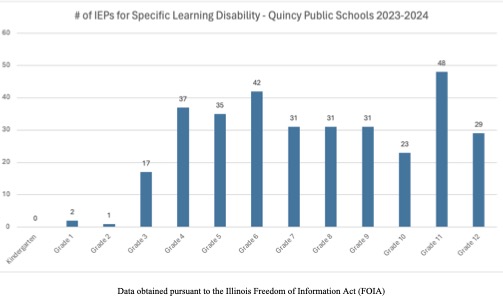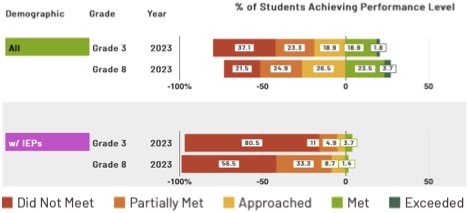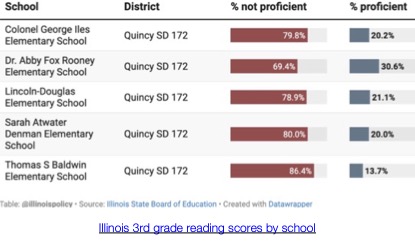Letter to the Editor: Who is responsible for QPS poor reading scores and wait-to-fail approach?

A recent flurry of editorials has been written on the dire state of our students’ reading proficiency in Quincy Public Schools (QPS), which raises the question: Who should be held accountable for only 20 percent of our third-grade students meeting proficiency standards in reading?
It is important to highlight that all parties involved are good people, yet this literacy crisis in our district is due to human failure. Someone must be held accountable for it.
There is no more crucial skill for your child to be taught in school than the ability to read and comprehend. Yet despite decades of reading research on how children learn to read, the debate rages on within our educational system. For better background understanding, please review my February 2023 letter to the editor “Is your child becoming a proficient reader in school? Statistics would say no,” as well as my January 2021 article in Contemporary Pediatrics.
Highlighted in my Contemporary Pediatrics article is what is otherwise known as the wait-to-fail approach. This occurs when a student in the early grades are not identified as having a reading disability when they are learning to read but rather when they transition in third grade to reading to learn when gaps between good and poor readers are already well established and also well past the time when word reading interventions are most effective.
This wait-to-fail approach with Quincy Public Schools can be seen by tracking the number of individualized education plans (IEPs) for specific learning disability (SLD), the assigned disability for struggling readers. In the graph below, almost none are identified as SLD until third grade, when the window for the most effective intervention is almost closed.

The graph below shows the 2023 Illinois Assessment of Readiness (IAR) data for English Language Arts (ELA) reading proficiency for third- and eighth-grade QPS students with IEPs, despite receiving more intensive reading intervention services.

This is heartbreaking. Only 3.7 percent of QPS third-grade students and 1.4 percent of 8th grade students with an IEP met ELA proficiency standards for their grade level. QPS students with an IEP also represent 17 percent of the total student population, which is higher than the state average. This points to an instructional problem, yet does the ultimate accountability lie with the School Board, superintendent, office of curriculum, the school or the parents?
The School Board
Board members are elected representatives of the community with the fiduciary responsibility of ensuring equitable and effective reading instruction for all students in the district. Board members can set the tone and direction of ELA curriculum instruction.
I advocated directly in May 2023 to the School Board in person regarding the upcoming selection of new ELA curriculum. Email requests to meet with all board members were met with a response only from Shelley Arns and Rachael Petty, who head the curriculum team and are responsible for recommending the curriculum for full board vote and approval.
I was especially hoping to sit down with member Latonya Brock to ask her thoughts on recent IAR data showing that only nine percent of Black third-grade students met reading proficiency standards. However, she never responded to my meeting request.
I responded to one board member that being denied access to meet with all board members to discuss literacy was not representative. He responded that all members were presented with all the information from the curriculum team. However, a FOIA request for all email communications between individual board members on the topic of curriculum and literacy yielded zero communications.
Considering that nearly 80 percent of our third-grade students are not proficient in reading, one would think that for our School Board, it would be all hands on deck rather than crucial curriculum decisions being made by only two board members.
The Superintendent
Per district policy, the superintendent is charged with recommending to the School Board a comprehensive curriculum as well as developing “a curriculum review program to monitor the current curriculum and promptly suggest changes to make the curriculum more effective, to take advantage of improved teaching methods and materials, and to be responsive to social change, technological developments, student needs and community expectations.”
I have personally met with Todd Pettit, and he has been gracious to respond to multiple email inquiries on the subject of literacy. However, I never received a response to my email dated March 30 in which I wrote:
Looking at specific cohorts of students — those who are Black, low income and with IEPs — they are doing very poorly. For students with IEPs, the lack of reading success is heartbreaking.
Of the total student population (3rd-8th grade), 26 percent are “in the red” (not meeting expectations) and 24 percent are in the orange (partially meeting expectations). That’s an awful lot of students for whom the instructional approach is not working.
Students with IEPs equals 17 percent of the total student population. Why are so many children qualifying?
Based on the data, can you say with confidence that QPS is delivering concrete instruction using evidence-based teaching methods?
How do you explain the IAR data?
Even our MAP data is tracking below the NWEA normative data which is already a low bar.
Every parent of a struggling reader is owed an answer to these questions.
The Office of Curriculum
Per my observations, the directors of curriculum advise both the superintendent and School Board on curriculum adoption and instruction. The public can follow this process by attending the District Improvement Committee (DIC) meetings. Historically, QPS has been a balanced literacy district and a Reading Recovery Training center, which I would contend is why our reading proficiency rates are so dire.
I have communicated through email and public comment at both the December 2022 and February 2024 DIC meetings about my advocacy for structured literacy and the selection of a knowledge-building curriculum such as Amplify CKLA over the ultimately selected basal program of Benchmark Workshop.
The Liberty School District adopted the knowledge-building Amplify CKLA curriculum a few years ago. I encouraged our district stakeholders to contact them about their experience with this structured literacy curriculum. In an April 2024 email communication with one board member, I was told, “QPS has been in contact with Liberty via emails asking questions about Amplify CKLA last summer/fall. We have had email communication … just not in person. We do not physically need to go into their building to get information.”
However, a FOIA request yielded zero emails from any QPS district personnel to any Liberty School District personnel about the topic of Amplify CKLA curriculum over this period.
Regarding Reading Recovery, to my knowledge, is still used in first grade as an intervention for struggling readers despite a recent longitudinal study showing a lack of benefit by fourth grade in reading proficiency in students who had received the intervention in first grade. New Zealand, the birthplace of Reading Recovery, has now banned it.

The School
Said best by journalist Emily Hanford, “I think it’s really important to recognize this is not the fault of our teachers … I have not run into a teacher who doesn’t want to teach their students how to read.”
Teachers can only know what they are taught in their respective training programs. However, many teacher prep programsstill do not train future teachers in the Science of Reading. Teachers also rely on their principal to be the instructional leader of the school. How many QPS elementary principals are trained in the Science of Reading?
Benchmark Workshop will be the new ELA curriculum starting this year, yet within the Science of Reading community, it is still considered closer to balanced literacy. Its publisher, Benchmark Education, declined evaluation by The Reading League, allowing for the suspicion that they know their curriculum does not align with the Science of Reading standards.
The Parent
What is the role of the parent in the teaching of their child to read? Are low reading scores due to a lack on our part of instilling the value of education in our child? Is it due to those teachers advocating for structured literacy instruction being silenced and pushed out by a district administration entrenched in balanced literacy? Is it due to a lack of an organized parent advocacy group to step up and demand accountability?
At the end of the day, who is responsible for teaching students to read? Parents or schools?
QPS parents crowded School Board meetings during COVID, advocating against masking and quarantines, yet sadly few to none regularly attend DIC or School Board meetings to hold the district accountable for failing literacy scores which will have more profound long-term negative consequences on their child. Organizationally, the school and curriculum office answer to the superintendent, who in turn is accountable to the School Board, who in turn is elected by and accountable to parents.
So with whom does the ultimate responsibility of correcting QPS students’ failed reading instruction lie?
Somebody must step up for our struggling readers in QPS. Nearly 80 percent of QPS students failing to read proficiently is unacceptable.
Who is it going to be? Where is the outrage?
Todd R. Porter
Quincy, Illinois
Miss Clipping Out Stories to Save for Later?
Click the Purchase Story button below to order a print of this story. We will print it for you on matte photo paper to keep forever.

